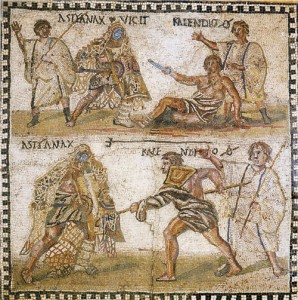Michael Carter, a professor at Brock University in St. Catharines, Canada, thinks he has figured out what killed the gladiator Diodorus 1800 years ago: a blown call. All we know of Diodorus we got from the epitaph and engraved image on his tombstone. He was born, fought and died 1800 years ago in Turkey, in the ancient city of Amisus (today called Samsun) on the north coast of Turkey, a major port on the south Black Sea. His tombstone was discovered in Turkey a hundred years ago and donated to the Musee du Cinquanternaire in Brussels, Belgium just before the beginning of World War I.
The engraved image depicts a gladiator holding two daggers standing over an opponent raising his finger in self-acknowledged defeat. The inscription says, “After breaking my opponent Demetrius I did not kill him immediately. Fate and the cunning treachery of the summa rudis killed me.”
 The summa rudis was the primary referee on the sand, often seen in mosaics as a togate official carrying a long staff (the rudis) which he used to separate fighters. He didn’t get to choose who lived or died, though. That was the job of the editor or munerarius, the sponsor of the games, who usually deferred to the will of the crowd. So the mystery of this epigraph was how could a summa rudis, even a treacherous one, be responsible for the death of Diodorus?
The summa rudis was the primary referee on the sand, often seen in mosaics as a togate official carrying a long staff (the rudis) which he used to separate fighters. He didn’t get to choose who lived or died, though. That was the job of the editor or munerarius, the sponsor of the games, who usually deferred to the will of the crowd. So the mystery of this epigraph was how could a summa rudis, even a treacherous one, be responsible for the death of Diodorus?
According to Professor Carter, who has made a study of gladiatorial combat and its intricate rule set, the summa rudis snatched Diodorus’ defeat from the jaws of victory.
Another rule that appears to have been in place was that a gladiator who fell by accident (without the help of his opponent) would be allowed to get back up, pick up his equipment and resume combat.
It’s this last rule that appears to have done in Diodorus. Carter interprets the picture of the gladiator holding two swords to be a moment in his final fight, when Demetrius had been knocked down and Diodorus had grabbed a hold of his sword.
“Demetrius signals surrender, Diodorus doesn’t kill him; he backs off expecting that he’s going to win the fight,” Carter said.
The battle appears to be over. However the summa rudis — perhaps interpreting Demetrius’ fall as accidental, or perhaps with some ulterior motive — thought otherwise, Carter said.
“What the summa rudis has obviously done is stepped in, stopped the fight, allowed Demetrius to get back up again, take back his shield, take back his sword, and then resume the fight.”
And thus Demetrius got a do-over and he made good on it, defeating Diodorus and either killing him on the sand or inflicting a fatal wound. Diodorus’ survivors then lodged their complaint against the ref in perpetuity.
Always blame the ref when you lose.
Zowie! I didn’t know gladiators had rules and refs to boot. I wonder if a loosing bettor on that contest paid for the memorial.
Or, you know, when you die. :giggle:
I didn’t know they had complex sporting rules and umpires on the field either, even though I’ve seen those togas and staffs in mosaics many times. I just didn’t make the connection.